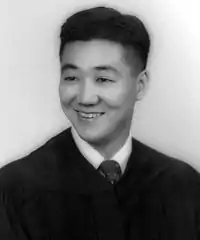James K. Okubo
James K. Okubo (May 30, 1920 – January 29, 1967) was a United States Army soldier.[1] He was a posthumous recipient of the Medal of Honor for his actions in World War II.[2]
James K. Okubo | |
|---|---|
 Technician James Okubo | |
| Born | May 30, 1920 Anacortes, Washington |
| Died | January 29, 1967 (aged 46) Detroit, Michigan |
| Place of burial | |
| Allegiance | United States of America |
| Service/ | United States Army |
| Years of service | 1943 - 1945 |
| Rank | Technician Fifth Grade |
| Unit | 442nd Regimental Combat Team |
| Battles/wars | World War II |
| Awards | |
| Other work |
|
Early life
Okubo was born in Anacortes, Washington.[3] His parents were Japanese immigrant parents. He was a Nisei, which means that he was a second generation Japanese-American.
The Okubo family was interned at the Tule Lake War Relocation Center in California;[4] and then they relocated to the camp at Heart Mountain in Wyoming.[1]
Military Service
Okubo joined the US Army in May 1943.[5]
Okubo volunteered to be part of the all-Nisei 442nd Regimental Combat Team.[6] This army unit was mostly made up of Japanese Americans from Hawaii and the mainland.[7]
For his actions in October 1944, Okubo was awarded the Army's third-highest decoration, the Silver Star. After the war, he became a dentist in Detroit, and was killed in a car accident on 29 January 1967.
In the 1990s, there was a review of service records of Asian Americans who received the Silver Star during World War II. Okubo's award was one of those upgraded to the Medal of Honor and in a ceremony at the White House, on June 21, 2000, the formal presentation was made by President Bill Clinton. Twenty-one other Asian Americans also received the nation's highest military honor during the ceremony, although, and unfortunately, only seven of them by then remained living to receive it.[8]
Okubo's Medal of Honor recognized his conduct in frontline fighting in eastern France in 1944.[2]
The words of Okubo's citation explain:
Technician Fifth Grade James K. Okubo distinguished himself by extraordinary heroism in action on 28 and 29 October and 4 November 1944, in the Foret Domaniale de Champ, near Biffontaine, eastern France. On 28 October, under strong enemy fire coming from behind mine fields and roadblocks, Technician Fifth Grade Okubo, a medic, crawled 150 yards to within 40 yards of the enemy lines. Two grenades were thrown at him while he left his last covered position to carry back wounded comrades. Under constant barrages of enemy small arms and machine gun fire, he treated 17 men on 28 October and 8 more men on 29 October. On 4 November, Technician Fifth Grade Okubo ran 75 yards under grazing machine gun fire and, while exposed to hostile fire directed at him, evacuated and treated a seriously wounded crewman from a burning tank, who otherwise would have died. Technician Fifth Grade James K. Okubo's extraordinary heroism and devotion to duty are in keeping with the highest traditions of military service and reflect great credit on him, his unit, and the United States Army.[9]
Namesake
Okubo is the namesake of the Okubo Family Health Clinic at Joint Base Lewis-McChord in Washington.[10]
The Okubo Barracks at the Fort Sam Houston in Texas are named after the Nisei soldier.[11] The barracks are now used for wounded soldiers.[12]
References
- Kakesako, Gregg K. "AJA medic’s medal may be upgraded," Honolulu Star-Bulletin, September 15, 2009; 2012-12-29.
- US Army Center of Military History (CMH), "Medal of Honor Recipients, World War II (M-S)"; retrieved 2012-12-29.
- Penta, Mia. "Japanese American Soldiers Celebrated," Archived 2008-12-02 at the Wayback Machine Asian Week. April 6, 2001; retrieved 2012-12-29.
- "Japanese American Internee Data File: James Okubo". National Archives and Records Administration. Retrieved 2019-08-17.
- NARA, WWII Army Enlistment Record #39914547 (Okubo, James K.); retrieved 2012-12-29.
- Go for Broke National Education Center, "Medal of Honor Recipient Technician Fifth Grade James K. Okubo" Archived 2012-10-22 at the Wayback Machine; retrieved 2012-12-29.
- "100th Battalion, 442nd Infantry" at Global Security.org; retrieved 2012-12-29.
- "21 Asian American World War II Vets to Get Medal of Honor" at University of Hawaii Digital History Archived 2012-03-17 at the Wayback Machine; retrieved 2012-12-27.
- Gomez-Granger, Julissa. (2008). Medal of Honor Recipients: 1979-2008, "Okubo, James K.," pp. 16-17 [PDF 20-21 of 44]; retrieved 2012-12-29.
- "Okubo Family Medical Health Clinic" Archived 2013-02-18 at the Wayback Machine; retrieved 2012-12-29.
- Air Force Housing, "JBSA-Fort Sam Houston," Okubo Barracks Archived 2013-01-16 at the Wayback Machine; retrieved 2012-12-29.
- Christenson, Sig. "Wounded GIs get round-the-clock care," San Antonio Express-News, September 7, 2009; retrieved 2012-12-29.
External links
- "Army Secretary Lionizes 22 World War II Heroes" at Defense.gov
- "James K. Okubo". Claim to Fame: Medal of Honor recipients. Find a Grave. Retrieved 2007-11-20.